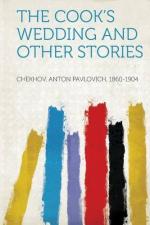“To think of thrashing him . . .” he mused. “A nice task to devise a punishment for him! How can we undertake to bring up the young? In old days people were simpler and thought less, and so settled problems boldly. But we think too much, we are eaten up by logic . . . . The more developed a man is, the more he reflects and gives himself up to subtleties, the more undecided and scrupulous he becomes, and the more timidity he shows in taking action. How much courage and self-confidence it needs, when one comes to look into it closely, to undertake to teach, to judge, to write a thick book. . . .”
It struck ten.
“Come, boy, it’s bedtime,” said the prosecutor. “Say good-night and go.”
“No, papa,” said Seryozha, “I will stay a little longer. Tell me something! Tell me a story. . . .”
“Very well, only after the story you must go to bed at once.”
Yevgeny Petrovitch on his free evenings was in the habit of telling Seryozha stories. Like most people engaged in practical affairs, he did not know a single poem by heart, and could not remember a single fairy tale, so he had to improvise. As a rule he began with the stereotyped: “In a certain country, in a certain kingdom,” then he heaped up all kinds of innocent nonsense and had no notion as he told the beginning how the story would go on, and how it would end. Scenes, characters, and situations were taken at random, impromptu, and the plot and the moral came of itself as it were, with no plan on the part of the story-teller. Seryozha was very fond of this improvisation, and the prosecutor noticed that the simpler and the less ingenious the plot, the stronger the impression it made on the child.
“Listen,” he said, raising his eyes to the ceiling. “Once upon a time, in a certain country, in a certain kingdom, there lived an old, very old emperor with a long grey beard, and . . . and with great grey moustaches like this. Well, he lived in a glass palace which sparkled and glittered in the sun, like a great piece of clear ice. The palace, my boy, stood in a huge garden, in which there grew oranges, you know . . . bergamots, cherries . . . tulips, roses, and lilies-of-the-valley were in flower in it, and birds of different colours sang there. . . . Yes. . . . On the trees there hung little glass bells, and, when the wind blew, they rang so sweetly that one was never tired of hearing them. Glass gives a softer, tenderer note than metals. . . . Well, what next? There were fountains in the garden. . . . Do you remember you saw a fountain at Auntie Sonya’s summer villa? Well, there were fountains just like that in the emperor’s garden, only ever so much bigger, and the jets of water reached to the top of the highest poplar.”
Yevgeny Petrovitch thought a moment, and went on:
“The old emperor had an only son and heir of his kingdom—a boy as little as you. He was a good boy. He was never naughty, he went to bed early, he never touched anything on the table, and altogether he was a sensible boy. He had only one fault, he used to smoke. . . .”




